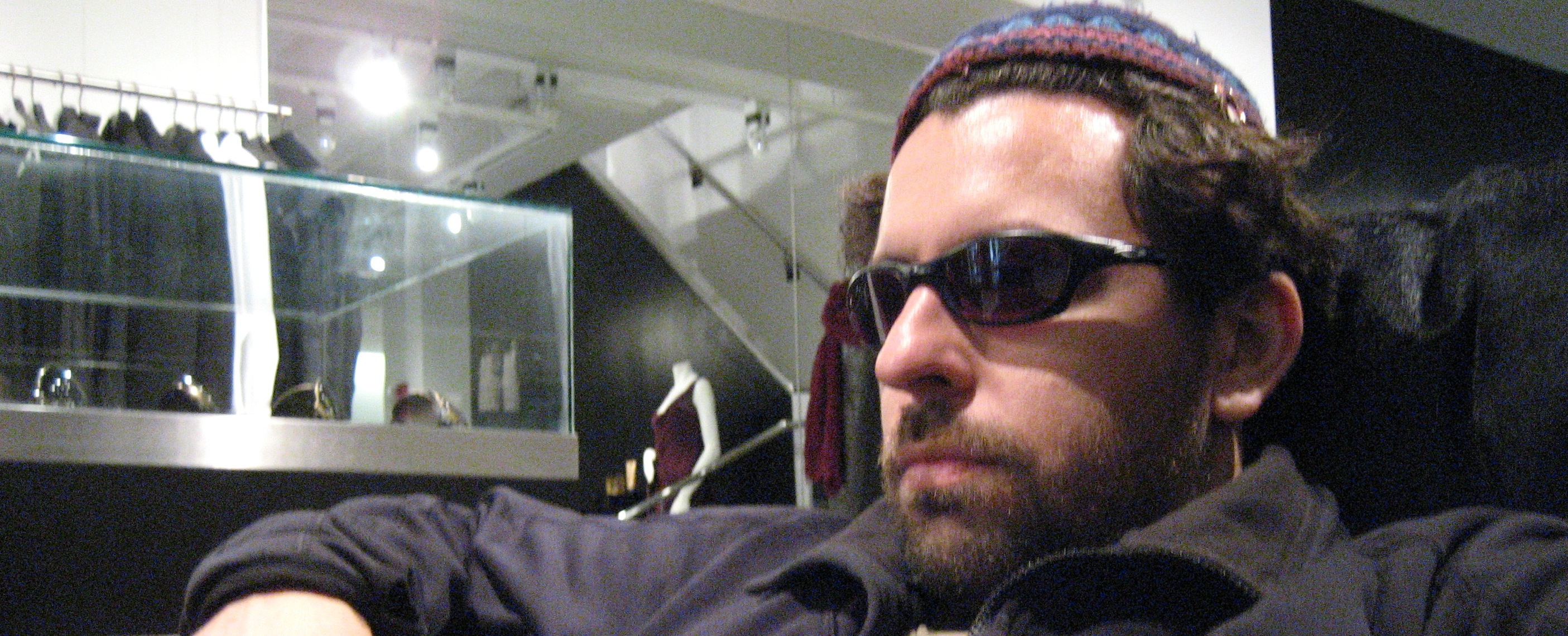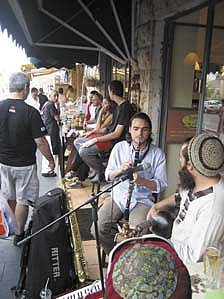Facing the music
Jerusalem’s live music industry suffers from lack of municipal support and dwindling audiences.
click here for original posting
By Amihai Zippor
After eight years of hosting performances by local and international musicians, the Syndrome, which was located on Rehov Hillel and was one of Jerusalem’s few venues for live music, closed in September. Though the pub’s former owner, Amichai Katz, attributes his financial losses mainly to the city’s urban renewal project and the massive construction going on downtown, the bigger issue, he says, was the lack of support his establishment received from the municipality even though it was a center for musical culture in the city.
“We had lots of problems over the years but the thing that really killed us as a pub was the three years of renovations on Rehov Hillel,” Katz says. “The foot traffic stopped, there were fewer parking spots and during the digging and paving and repaving nobody could come near the bar.”
Eventually the low turnout from the weekends, which supported the rest of the week and allowed Katz to hold the live music shows Sunday through Thursday, caused the business to fold. Though Katz understands Jerusalem is one of the poorest cities in the country and infrastructure in the capital must be improved, he still believes businesses like his own should have been compensated by the city and that he was given a raw deal.
“I can see why education and helping the poor is more important than music,” he says. “Of course, as a musician and a person who deals with culture in Jerusalem it hurts and I think that maybe it could have been done better.”
On this point, Deputy Mayor Yigal Amedi, who holds the culture portfolio, says: “Clearly we’ve come to a point where we need to modernize the center of the city in order for it to be alive and bustling. Unfortunately, doing so damages some of the businesses but the purpose is to eventually improve their standing because the place will be nicer and cleaner.” Commenting on the loss of the Syndrome and the importance of reopening similar places like it, Amedi says he is optimistic that “Jerusalem has a bright future for musicians, as it is currently in a process of development.”
Still, Katz believes the damages he incurred were just a symptom of a larger problem regarding the municipality’s lack of support for the music scene, the strain of which is not only felt by the pubs and restaurants downtown but also by the musicians themselves.
Yitzhak Meir Mallek, who has one of the city’s few regular gigs playing playing in the duo “Think Twice” Wednesday nights at the Sideways Bar on Rehov Heleni Hamalka, loves Jerusalem and appreciates the opportunities given to him, but he is also very critical when it comes to the support local establishments give to artists like himself.
“I never liked the scene in Jerusalem because what I did see was places where people passed around a tip jar in order to pay musicians,” says Mallek. “Sometimes they would only receive NIS 20 and that’s really nothing if music is your profession.” Furthermore, for many of the musicians who do stick around Jerusalem, performing can be a less than enjoyable experience.
“When you are dealing with a club owner who can’t really afford having gigs, which is most of Jerusalem, you’re dealing with a very nasty situation,” says local drummer Jono Landon. “They can be so nice when they hire you and then at the end of the night they rip you off and it’s not pleasant.” He adds: “Jerusalem needs club owners who have the ability to make an investment that will continue for the next decade so when the scene grows they are making a profit, as opposed to today, where owners try to rip off the musicians because they’re so frustrated by their own financial situations.” Landon cites the new Canaan Bar on Rehov Shamai as an example of a venue that is headed in the right direction.
CANAAN WAS opened after Liav Haddad and a few of his friends found themselves listening to Israeli music on the radio or TV because there was no place in the city center to sit and enjoy up-and-coming artists. Upon realizing many other Israelis in the capital felt similarly, the group of friends decided to try to change the situation by offering a venue for all kinds of acts, as long as they were Israeli. Canaan is managed by a mix of religious and secular 20-somethings, which helps bring in a broad range of customers.
“To make this happen in the capital is not easy but we are trying to do it because we love music and we love Jerusalem,” says Haddad, noting that since the Syndrome had closed there were very few commercial venues where artists could play without having to pay large fees. “There are places like Hama’abada and the Yellow Submarine, which are bigger and are located outside the center of town, but they are private organizations and receive funding from institutions such as the Jerusalem Foundation,” he says. Haddad explains that because the larger establishments have more money and the smaller places can’t afford to pay bands, many musicians go to Tel Aviv where there are more opportunities and higher returns.
Exacerbating the situation is the fact that Jerusalem patrons buy very little alcohol and are wary of paying cover charges, which makes the risks of commercial failure even greater. It’s no surprise, then, that very few club owners are willing to offer their venues to musicians during the week, so that the little live music that can be heard is usually along the Ben-Yehuda pedestrian mall. Still, there are places that are fighting the grim trend and trying to change it.
“Today nobody supports any kind of musical culture in Jerusalem: basically I can understand musicians who leave, as I tried for a year-and-a-half to support them and I lost quite a lot of money, because at the end of the day you have to pay the artists, your staff, yourself and the government,” says Yehuda Melamed, manager of Nahlaot’s Kubiyah 18. Over the past year Melamed has unsuccessfully lobbied well-known Jerusalem-based institutions to secure funding for artists in order to relieve some of the pressure for doing so from business owners. Melamed is currently talking with the municipality about the possibility of establishing a non-profit organization that would aid entertainment venues like the Kubiyah, and offer a regular schedule of concerts.
“I’m trying to work things out with City Hall and see if we can get something going so when a person opens up the paper on a Monday he will find jazz, Jewish, religious, ethnic and any other kind of music playing all over the place so the city won’t be dead like it is today,” says Melamed. If he succeeds, the proposed NGO would allow anyone in the city who is musically talented to apply, register for two performances a month and receive payment. The artists, for their part, will have to provide music that is conducive to a particular establishment’s environment. Furthermore, if a band plays and there is an empty house, they will not be assigned to that venue again. Melamed says the opposition he has encountered in trying to improve the music scene comes down to one thing: Politics.
“In Jerusalem, culture is not for the people; it’s for whoever can put his hand in and grab as much money as he can,” he says. “Otherwise my plan would be enacted and promote so many people and produce so much music in Jerusalem that it would eventually turn the city upside down, and it would become the cultural capital of Israel and the world that it should be.”
While acknowledging that “there is a genuine problem” with municipal support for cultural events in the capital, Amedi is quick to remind critics that the city can only give as much as the government allots it in the budget, and adds that it is against the law for the city to give money directly to businesses. Like the municipality, the Jerusalem Foundation does not support private businesses, but its spokeswoman, Liat Rosner, said if enough frustration over the current trend was presented to its offices, there was a good chance it would find a way to help local artists.
Meanwhile, at places like the D. Grey Art Café, which opened eight months ago on King George Avenue, owner Leah Levit is unsure if extra funding is the answer, though it would help. Two nights a week D. Grey hosts an open piano bar, but even when attendance is low, Levit attributes it to a lack of interest, not funding.
“We have had some of the biggest names in the Israeli jazz world, like Elon Turgeman and Omri Morley, but still, even with lots of advertising, we have great difficulty filling the space,” she says.
Local producer and technician Gil Stein, who plays at both D. Grey and at Berman’s off Rehov Ben-Yehuda, says there is a growing underground music scene. This lot of young musicians playing rock and jazz music, he says, are forming the next cultural wave in Jerusalem. “Someone from Jerusalem who wants to make it fast might choose to go somewhere else, but I think that the musicians who stay here to do their music live more for the music than for the business,” concludes Stein. “If you are a musician in Jerusalem and you want to play, you’ll find yourself playing everywhere.”



